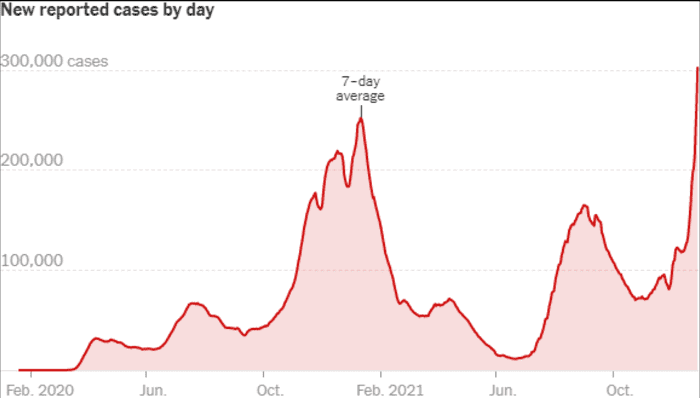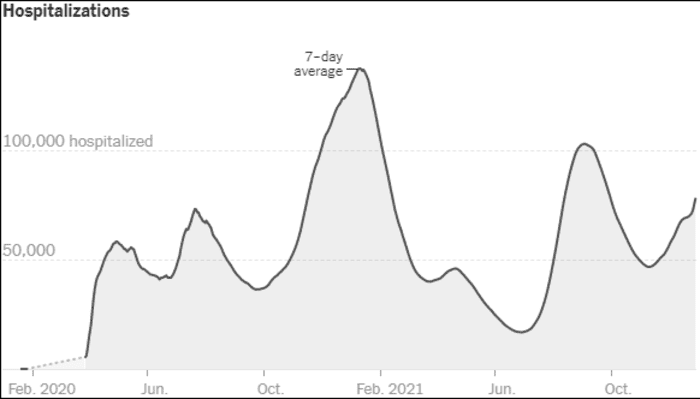This post was originally published on this site
There are a lot more people sick with COVID-19 today than ever before, but evidence is piling up to suggest the surging omicron variant results in less severe illness than the previously dominant delta variant.
That, coupled with increasing questions over the accuracy of official positivity rates from testing, has led to a growing number of calls for health officials, and media, to focus on COVID-19–related hospitalizations, and deaths, over cases.
That said, the seven-day average of new cases of COVID-19 climbed to 301,472 on Wednesday, according to a New York Times tracker. That’s up 12.8% from 267,305 on Tuesday, up 153% from two weeks ago and about 3½ times the average on Dec. 1. It is also 20% above the Jan. 11 peak of 251,232.

New York Times
Meanwhile, the daily average of hospitalizations was 77,851 on Wednesday. While that is up 14% from two weeks ago, and the most since Sept. 30, it is well below the Jan. 10 peak of 137,438.

New York Times
And the daily average death count fell 7% from two weeks ago to 1,207, just a little more than a third of the January peak of 3,326.
For a comprehensive daily rundown: Follow MarketWatch’s daily Coronavirus Update column
The White House’s chief medical adviser, Dr. Anthony Fauci, reviewed at a press briefing on Wednesday some “preliminary observational clinical data” and some laboratory data from other countries showing hospitalization rates linked to the omicron variant were significantly lower than previous variants.
“[T]he data are encouraging but still, in many respects, preliminary; yet they are getting stronger and stronger as additional data are accumulated. And it is still unclear how these data will translate to other demographically diverse populations in the United States and elsewhere throughout the world,” Fauci said.
“But having said this, all indications point to a lesser severity of omicron versus delta,” he said.
Fauci reminded, however, that hospitalizations and deaths are lagging indicators, meaning hospitalization rates could increase as the cases continue to climb, especially among the unvaccinated.
“And so, to repeat what we say so often and that deserves reemphasis: The risk of severe disease from any circulating variant, including omicron, is much, much higher for the unvaccinated,” Fauci said.
Centers for Disease Control and Prevention Director Dr. Rochelle Walensky followed with some supporting data on the effectiveness of vaccines: “If you are unvaccinated, you are 10 times more likely to be a case and 20 times more likely to be a fatality; compared to people who are unvaccinated, you are 17 times more likely to be in the hospital.”
There are increasing worries over omicron’s impact on children, as the number of hospitalizations of children have increased and the vaccination rates of people between the ages of 5 and 18 are much lower than among the adult population.
The seven-day average of daily hospitalizations for children between Dec. 21 and Dec. 27 was up more than 58% nationwide in the past week, compared with around 19% for all age groups, as Reuters reported using CDC data.
A MarketWatch analysis of CDC vaccination data showed that roughly 33% of Americans aged 5 to 17 were fully vaccinated, while about 73% of adults were fully vaccinated.
More numbers and news
- The U.S. states with the highest daily average of COVID-19–related hospitalizations per 100,000 people as of Wednesday was Ohio with 45. The state was 34th in the percentage of its population who were fully vaccinated. Republican Gov. Mike DeWine, who has in the past opposed mandates for vaccines that were fully approved by the U.S. Food and Drug Administration, said Wednesday that vaccines remain a “powerful tool” to keep people out of the hospital. Since June 1, he said there have been 35,962 COVID-19–related hospital admissions in Ohio, and 92.5% of those admissions have been people who where not fully vaccinated.
-
The CDC warned Americans on Thursday that they should avoid traveling on cruise ships, even if they are fully vaccinated, amid an increase in the number of COVID-19 cases among passengers and crew and in the number of ships under investigation. Earlier Thursday, Royal Caribbean Group
RCL,
-0.24%
looked to play down the impact of the omicron variant on its cruises, saying the number of cases has been relatively low and the impact on bookings has been less than what was experienced with the delta variant. The company said that out of 331 destination calls it has only canceled or “significantly modified” 16, or 4.8%. And since cruising was restarted in the U.S. this June, the company said it has carried 1.1 million guests, with only 1,745 people, or 0.02%, testing positive for COVID-19, while only 41 people needed to be hospitalized. The company said none of the omicron cases have been severe or required hospitalizations. -
Johnson & Johnson
JNJ,
+0.64%
said a South African Phase 3 study showed that a booster shot of its COVID-19 vaccine was 85% effective in preventing COVID-19–related hospitalization. The drug manufacturer said the study, conducted by the South African Medical Research Council, was conducted from mid-November to mid-December, which was after omicron became the dominant variant. “This adds to our growing body of evidence which shows that the effectiveness of the Johnson & Johnson COVID-19 vaccine remains strong and stable over time, including against circulating variants such as Omicron and Delta,” said Mathai Mammen, global head of J&J’s Janssen Research & Development LLC. -
Ocugen Inc.
OCGN,
+10.64%
said its partner, Bharat Biotech, reported positive results from a trial of its COVID-19 vaccine candidate. In a Phase 2/3 trial in India, the company said Covaxin demonstrated in children 2 to 18 years old a “robust” neutralizing antibody response and “favorable” safety profile on the pre-print server. And when using a two-dose regimen given 28 days apart, there was a greater than 93% reduction in severe disease, similar to data from a previous Phase 3 study in adults. “These data represent the first positive vaccine data in children as young as 2 years of age and come at an important time as COVID-19 infections are seeing a spike across the globe,” said Ocugen Chief Executive Shankar Musunuri.
Market Pulse: Cruise stocks dive into negative territory after CDC recommends avoiding cruise travel
Global tallies
The global tally for the coronavirus-borne illness rose to 285.53 million as of Thursday afternoon, while the death toll grew to 5,426,781 million, according to data aggregated by Johns Hopkins University.
The U.S. remains the world leader in total cases, with more than 53.88 million, and in deaths, at 823,307.
India is second by cases after the U.S. at 34.82 million and has suffered 480,860 deaths, as of the latest count. Brazil has the world’s second highest death toll at 619,095 and is third in cases at 22.27 million.
In Europe, Russia has had the most fatalities at 301,791, while the U.K. has had the most cases with 12.63 million.

